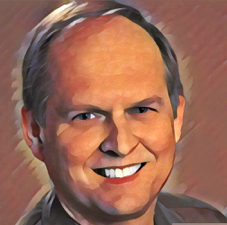A discussion on the innovation of governance with the father of futarchy Robin Hanson
Democracy has been the gold standard in modern politics since the Founding Fathers signed the Declaration of Independence, and it’s not likely to go away anytime soon. But recent events in Europe (Brexit) and the US (Presidential election) indicate that there is demand for new governance models.
With that in mind, I was excited to discuss the innovation of governance with Robin Hanson. Robin is a George Mason University Economics professor and wrote the seminal paper on futarchy, an alternative governance concept best described with the phrase "vote values, but bet beliefs." Robin also runs a blog called Overcoming Bias, advises the prediction market project Augur and recently published a book called The Age of Em.
Here's our discussion:
NT: What inspired you to come up with the concept of futarchy?
RH: Around 1988 I realized that speculative markets had enormous potential to usefully aggregate information on important topics. I began to write a lot about that. Ten years later I realized that decision markets, i.e., markets on outcomes conditional on decisions, were especially potent. And two years later I wrote about how such markets could be used for governance, as a way to dramatize this potential.
NT: Do you think we’ll see futarchy used by a significant segment of the population in your lifetime?
RH: I really don’t know. I have hopes, but institutional innovations have often sat on the shelf for decades before people started to use them. Even though decision markets offer great benefits to organizations as a whole, they can be very disruptive to the political coalitions that control organizations.
NT: What are some of the most interesting practical implementations of futarchy that you’ve seen?
RH: We’ve had a few conditional markets that could have been used to inform decisions. These include markets predicting the party of the US president conditional on the party’s nominee, and on bitcoin values conditional on key bitcoin decisions. But as far as I know none of these markets has substantially influenced its matching decision. We still await the first live use case where decision makers put substantial weight on market prices.
NT: Some point to the failure of the prediction markets in the recent U.S. presidential election as evidence that prediction markets would be a poor proxy to determine policies. What do you think?
RH: One election contains only a small amount of data compared to the data sets we’ve had to judge prediction market accuracy. You have to judge based on the biggest data sets you can find, instead of cherry picking examples.
NT: Are there any other alternative governance models that are particularly exciting to you?
RH: I’m especially interested in the potential to use combinatorial auctions for city land use regulation. I discuss this and decision markets in my new book The Age of Em: Work, Love, and Life when Robots Rule the Earth.
NT: I know you're an advisor to the Augur team - how closely do you pay attention to the blockchain world? Are you spending a lot of your time in the space and are you interested in advising other projects?
RH: I’m happy to advise any group trying to use prediction markets, but I’m not paying close attention to blockchains. I’m still waiting to see them find a way to provide sustainable value to a large set of ordinary customers. Without that, I fear they just can’t last.


Thanks for sharing, I'm all for looking at how we can improve our governance model, and I'd never heard of futarchy.
I had to re-read Robin's answer to your question about prediction markets in this US Presidential election a few times and I'm still not sure I understand the implication.
Was the failure of prediction markets in this instance a fluke? Do we need a degree of big data far larger than what's available to us now to rely on prediction markets? Was the data supporting this particular election far smaller than we usually have for other predictions?
I know you're not him, so I don't expect you to have an answer, just figured I'd ask. :)
I believe Robin's just suggesting that to make a judgement about the effectiveness of prediction markets, you must look at a wide data set. Prediction markets clearly failed in the election, but you can't make the judgement that they're bad just based on this tiny dataset.
This is a great article and thanks for sharing. Upvoted and shared on Twitter✔ for my followers to read. Now following and looking forward to reading more of your posts. Cheers. Stephen
https://twitter.com/StephenPKendal/status/797233828863627264
Disclaimer: I am just a bot trying to be helpful.